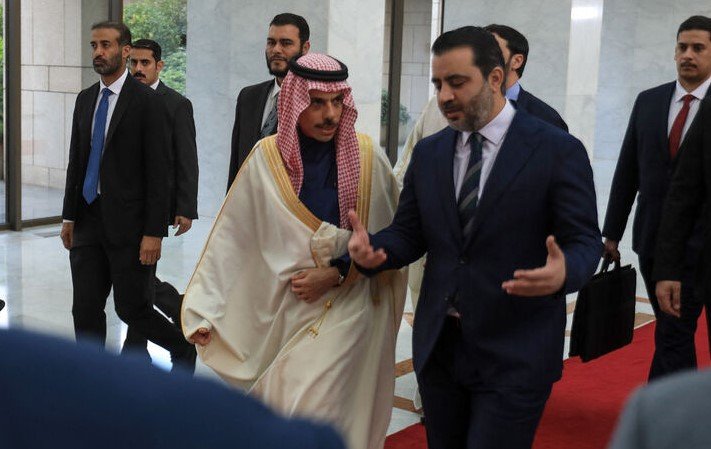Cement factories, energy projects, and retail megasites mark Riyadh’s bold bet on Damascus after Assad’s ouster
A Saudi Arabian business delegation touched down in Damascus on Wednesday with big money and even bigger ambitions, as Riyadh moves to cement its influence in war-scarred Syria following the fall of Bashar al-Assad.
Led by Investment Minister Khalid bin Abdulaziz Al-Falih, the delegation includes 130 business leaders and is expected to finalize deals valued between $4 billion and $6 billion — a staggering figure for a country still crawling out from under the rubble of a 14-year civil war.
From Isolation to Investment: A Swift Turnaround
Syria was a diplomatic pariah just months ago. Now, with interim President Ahmed al-Sharaa in power and Saudi Arabia stepping up support, the narrative is shifting fast — and so is the money.
Al-Falih arrived with a slate of proposals spanning sectors from energy and telecom to finance and hospitality. His first day in Damascus was a flurry of groundbreaking ceremonies and quiet room negotiations.
One senior Syrian official, who declined to be named, said the scale of the investment “surpasses anything seen since before the war began.”

A Look at the Numbers
At a press conference in Damascus, Syrian Information Minister Hamza al-Moustafa confirmed that 44 agreements were being finalized, with a total estimated value nearing $6 billion. Some of these are government-to-government, others private-sector to public entities.
Here’s what’s on the table, according to both Syrian and Saudi sources:
-
Energy infrastructure partnerships
-
Telecommunications modernization
-
Launch of joint investment funds
-
Financial and banking sector reforms
-
Retail and commercial real estate developments
Some agreements were inked on the spot. Others are expected to be signed during a two-day investment conference currently underway in Damascus.
Key Groundbreakings on Day One
Even before the conference officially opened, bulldozers were already moving.
In Adra Industrial City, northeast of Damascus, Al-Falih and Syrian officials broke ground on a white cement factory — the country’s first — with $20 million in initial funding. Syrian state agency SANA reported that the plant is expected to begin production in mid-2026.
Later, the minister joined executives from Saudi investment group Ethraa Holding to launch an integrated retail development worth 375 million riyals ($99.96 million), also in Adra.
“These are not token projects,” a senior Ethraa official said. “This is about long-term play. We’re building roots, not just returns.”
Saudi Eyes on Syria’s Next Big Sectors
Riyadh’s appetite doesn’t stop at cement and shopping centers. According to a Syrian businessman familiar with ongoing talks, the Saudis are also exploring:
-
Airport management and modernization
-
Hospitality and tourism infrastructure
-
Solar and off-grid energy investments
-
Digital banking and mobile payment networks
“These aren’t vanity projects,” he said. “They’re areas where Saudi firms already have expertise, and they see Syria as a blank canvas.”
Syria and Saudi Arabia are also launching a joint business council, which will serve as a formal coordination mechanism between private and state players across both nations.
Who’s Really in Charge?
While the Assad regime is gone, observers note the political waters are still murky. President Ahmed al-Sharaa leads what Saudi Arabia and a number of Arab League members recognize as the interim transitional government, but not every global power has signed on.
The presence of Saudi ministers on Syrian soil — something unthinkable even last year — underscores how regional powers are trying to move forward even as broader legitimacy debates simmer.
“The Saudis are treating this like Libya 2.0 — get in early, shape the rebuild,” said an analyst with a Gulf-based sovereign wealth fund who monitors Levant investment trends.
One sentence here: Deals are still subject to political risk, and everyone knows it.
Investment Conference Kicks Off Despite Tensions Elsewhere
Originally scheduled for June, the Damascus investment conference had been postponed due to the Iran–Israel war. This week’s edition is going ahead despite deadly sectarian clashes in Syria’s southern city of Sweida that have left hundreds dead.
Security was tight around the venue — a hotel compound just outside central Damascus — with plainclothes Syrian agents, Saudi private security, and even a few Russian-speaking guards spotted in the lobby.
The conference, described by one regional diplomat as “half Davos, half Damascus,” is expected to run through Thursday with closed-door pitch sessions, ministerial briefings, and bilateral roundtables.
What Comes Next?
Whether all these billions will translate into real infrastructure, jobs, and economic revival remains to be seen. Syria’s banking system is fragile. Electricity shortages are common. And the scars of war — both physical and psychological — are everywhere.
But the message from Riyadh is clear: the time to invest is now.
If even half the agreements signed this week go through, Syria could be on the cusp of its largest economic transformation since 2010. And Saudi Arabia, having emerged as both funder and facilitator, could become Syria’s single most important external partner.
